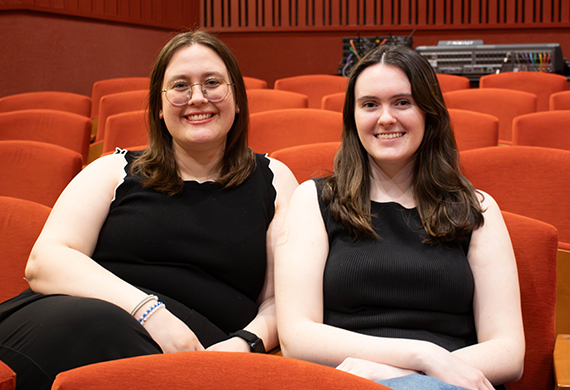-
About
Marist Commencement
Celebrating the Class of 2025
• The graduate ceremony will be held on Friday, May 23.
• The undergraduate ceremony will be held on Saturday, May 24.About
-
Academics
Marist Commencement
Celebrating the Class of 2025
• The graduate ceremony will be held on Friday, May 23.
• The undergraduate ceremony will be held on Saturday, May 24.Academics
-
Admission & Financial Aid
Marist Commencement
Celebrating the Class of 2025
• The graduate ceremony will be held on Friday, May 23.
• The undergraduate ceremony will be held on Saturday, May 24.Admission & Financial Aid
-
Student Life
Marist Commencement
Celebrating the Class of 2025
• The graduate ceremony will be held on Friday, May 23.
• The undergraduate ceremony will be held on Saturday, May 24.Student Life
- Athletics
At graduation
red M background
Enhance Any Major With Sociology
Marist's sociology minor will inform any career path. Learn how to analyze mass media, how life experiences are shaped by social statuses, how to develop your voice in society, and how to spark social change.

Complement your academic pathway with a sociology minor...
The sociology minor within the School of Social and Behavioral Sciences is an 18 credit interdisciplinary minor. You’ll take five required courses and one elective course, which can incorporate your major, another minor, or any field in which you’re interested. The flexibility of the minor stems from its integration with any other discipline – Media Studies, Political Science, Business Administration, and Environmental Studies are just a few examples of programs that can align with the minor and truly be informed by the knowledge you’ll gain from sociology. Here are the courses you’ll take:

...just take Justin as an example of how to tailor your education.
Justin Camero ’20, a Psychology major with minors in sociology and music, is a passionate vocalist with the Marist Singers and plans to share his musical experiences with children through his future career as a music therapist. Justin hopes to use his coursework in psychology and sociology, paired with his love of music, to make a difference in children’s lives: “I love helping people, so I want to share these experiences with children and let them know that they, too, can have these opportunities. I want them to know that they’re capable of more than they realize and that things can and do get better.”
Enhance your resume with sociology...
The sociology minor and courses at Marist are incredibly versatile in their advantages toward your career. Every career path will benefit from a deep understanding of interpersonal relationships, social theory, and research. How? Here are just a few examples of ways the sociology minor can enhance your major toward a well-rounded career path.
- Enhance your research methods for a career in political science
- Expand your knowledge of human interaction for a career in screenwriting and media
- Inform your strategies in social change for a career in non-profit management
- Broaden your understanding of structural racism for a career in criminal justice
- Develop knowledge of interpersonal dynamics for a career in human resource management
- Deepen your understanding of the social aspects of technology for a career in computing science
Customize Your Academics to Fit Your Passions
The Minor in Sociology is designed to integrate well with any other major, minor, or concentration. Below are just a few examples of fields of study enhanced by the Sociology Minor:
Psychology
A sociology minor will only further enhance your practical knowledge of psychology of social interactions and inform a career in psychology.
Major, Minor
Business
As a manager or business leader, a knowledge of sociology will help to provide meaningful strategies for positive relations within a work environment.
Major, Minor
Women's, Gender, and Sexuality Studies
Sociology is at the root of social issues and modes of activism in all communities, which is why a minor in sociology provides a complementary layer of knowledge for those pursuing the Women's, Gender, and Sexuality Studies Minor.
Minor
Games and Emerging Media
As a developer of games, apps, virtual reality, and other media, having an in-depth knowledge of the social components and psychological strategy behind this technology will improve your thinking and enhance your career path in this industry.
Major, Minor
Develop the Skills to Set You Apart

Social Awareness
Learn how multiple societal structures (family, gender, class, race, etc.) interact to determine social institutions and social behavior.

Cultural Competence
Students integrate diversity, equity, and inclusion to support effective practices in their fields.

Scientific Reasoning
Students use empirical tools to develop hypotheses, collect and analyze data, and form evidence-based conclusions.
Image of students walking in front of the rotunda.
The Value of a Marist Education
At Marist, we pride ourselves on our dedication to providing our students with a well-rounded liberal arts education that prepares them for practical experience and profound success in their field. But don't just take our word for it - the numbers speak for themselves.

Employed or attending grad school 6 months after graduation

Of Marist Graduates Participated in one or more internships

Graduation rate, higher than the average for public and private colleges

Best Undergraduate Teaching
*As reported by U.S. News and World Report.

Top 10 Regional Universities-North

Awarded one of America's Best Colleges
Featured News
Students voted, and the results are in. Find out who was honored as top faculty by their students at this year's awards, organized by the Student Government Association.
Students Learn to Power Live Entertainment at Theatre Technology Conference
Molly Emmens ’25 and Rhiannon Moline ’25 gained hands-on experience with live entertainment at the annual United States Institute for Theatre Technology (USITT) Conference.
Fighting Fires and Forging Friendships
Dr. Jamie Freiman, professor of accounting, and student Ryan Ferber '26 serve their community and create lifelong connections as volunteer firefighters.



